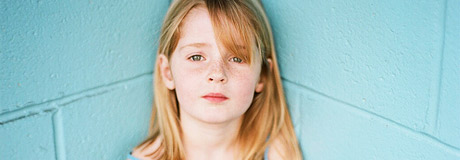How to Be Yourself
 Photo by
Lauren Rose
Photo by
Lauren Rose
Have you ever been in a social setting, suddenly realizing you are not being yourself? This article takes an in depth look at why we play various roles in our lives, and how to overcome these socially conditioned “masks” to be yourself.
Perhaps you’ve caught yourself saying, “I love catching up with my old school buddies, it’s so easy to be myself in their company”? Or, “Felt so miserable at that party, making polite conversation with bunch of superficial people.”
It transpires that we are often not our true selves in the company of others – subconsciously and repeatedly wearing masks that project a certain image of us to the world.
We seem to have a collection of these masks that habitually surface, intending to best serve our self-interest, based on the need of our immediate environment. These masks come in varied shapes and colors like, the aggressor, the conformist, the nice guy, the shy one, etc.
Only when we are able to bring these masks into our active awareness and deal with them, can we be ourselves and experience the freedom that brings.
Why Do We Pretend?
We acquire these masks from various experiences through life – those gained during our childhood being the most notable and lasting ones. It’s our primal instinct and desire to be loved. This is such a deep longing that right from our childhood, we are constantly adapting to our environment and building different strategies, so we can better fulfill this need.
Depending upon what seems to work, meaning specifically what helps gain our parents’ love during our early years, we subliminally begin to cement those strategies into our psyche.
Some of these become so deep rooted that as adults, we see them as an integral part of our personality – acknowledging it with comments like, “this is the way I am and it’s hard for me to be any other way”.
The Different Types of Masks
1. High Performer
As bestselling author, John Gray explains in “What you feel, you can heal”, this is how it works. If we were recognized for exceeding our parents’ expectations, say at school, we can grow up believing that being a high performer is the real ticket to be loved.
As a result, one may always aspire, and even go to great lengths, to exceed others’ expectations, be it one’s supervisor, peers, or spouse. Falling short of our own expectations in any way then is a source of disappointment and an opportunity to blaming ourselves. Also, with this approach, we have high expectations of others and can be very judgmental of them.
2. Conformist
If we were loved and encouraged every time we followed our parents’ directives, we can easily grow up being a conformist, believing that it would not be in our self-interest to go against the norm in any group – a family, social circle or an organization.
3. Diplomat
Similarly, we could play the diplomat, keeping our true feelings to ourselves but seeking to create a congenial atmosphere in a group; the reserved one, always hiding our true selves in the belief that we are not lovable anyways.
4. Poor Me
The poor me person believes in the notion that “only when I am in deep trouble and wronged can I attract others’ attention and love.”
5. Aggressor
The aggressor is the person for whom anger and show of superiority is the way to get noticed.
6. Critic
The person who is constantly finding faults with others in order to hide their own inadequacies.
7. Bragger
The bragger, where lack of self-esteem leads to eulogizing about oneself in the hope of being loved and admired.
—
These masks get hard wired in our personality and show up in every aspect of our life, including at work and in our relationships.
A high performer belief system may result in a workaholic or a perfectionist; a poor me mentality may constantly attract trouble – physical or emotional; a critic is never happy with the way things are in any setting and so forth.
As these patterns are accompanied by suppressing our true feelings, they create ongoing emotional baggage in our lives. There’s always then an inner sense of incompleteness, and we are unable to fully experience an emotionally satisfying life.
How to Be Yourself
“There is but one cause of failure and that is
a man’s lack of faith in his true self.”
~ William James
Despite our subconscious behavior patterns, we can free ourselves from these limiting beliefs and tendencies. This requires making a conscious choice to be true to our feelings and being honest in all our interactions.
At a deeper level, this entails connecting with our pure inner self and realizing that we are truly worthy of being loved, and are capable of fully loving others. That then provides us the courage to express our true thoughts and feelings, without the fear of being judged.
Social interaction is such a key part of human experience that social neuroscientists now believe that as many as four out of every five thoughts we have are in the context of relating to others.
Further, research by Richard Boyatzis, an Emotional Intelligence expert, highlights how fear of social rejection is one of the three most common causes of human stress. A commitment to being authentic in all our interactions can liberate us – feeling confident of being lovable allows us to not suppress our emotions, making us emotionally healthy and resilient.
As Mark Twain said, “If you tell the truth you don’t have to remember anything.” It also supports us in being more open to seeking others’ help and be willing to be vulnerable, which in turn, may make us even more endearing.
Let me share a couple of quick examples from my coaching experience here. A senior executive, who wanted to work on his relationships, was described by his colleagues as the critic – very controlling, had high expectations of them, and dealt with every shortfall with harsh words.
As he consistently received negative feedback about his relationships and felt highly stressed from his work life, he was committed to make some real changes. As he became more self-aware, he started to notice the underlying beliefs for his difficult behavior – felt it was his egoistic desire to be right, perfectionist nature, and a deep desire to succeed.
As we worked together, he started to shift his expectations from seeking perfection to more wholesome progress; started to better listen to others and put their agenda before his own; became more comfortable with his true self and less judgmental of others – accepting himself as he was and others as they were; overall, becoming more authentic in his listening, sharing, and conduct. Guess, authentic leaders realize that the power lies not in being right, but in being real.
Another client of mine was always striving to be the nice guy, trying to find a suitable compromise to resolving any friction between his parents and his wife. While this served him alright in the initial years, over time, he started to appreciate that this wasn’t really working – his parents expressed always feeling short changed; his wife felt her point of view was never fully respected; the client himself felt stifled constantly searching for convenient solutions that could somehow please everyone.
Paying attention to this, somewhere he recognized the need to begin expressing his honest thoughts and feelings to all parties – this meant bringing the problems of family disconnects in the open for all to see rather than hide them. As he gathered the courage to candidly confront the problems, the family collectively decided to take on some hard decisions – resulting in the client feeling relieved, and everyone feeling comfortable with the decisions.
As is evident in these examples, this process kind of involves two steps:
- Knowing yourself, and then,
- Choosing to be yourself.
Knowing yourself revolves around building a deeper understanding of our tendencies to hide behind various masks and being willing to examine them.
As long as there is friction in our relationships and a sense of incompleteness or dissatisfaction in our hearts, we need to remain open to examining our selves and our inner belief systems.
A willingness to dive deeply into our core leads to realizing who we are and how whole, complete and perfect we all are – and that raises our ability to love ourselves as well as to stop doubting our worthiness to receive others’ love.
Being yourself then is about taking responsibility towards overcoming our habitual traits and building the capacity to express ourselves fully and honestly. This means being mindful of our choices at all times and choosing to being totally authentic without being fearful of the outcomes of our words and actions.
Being yourself eventually shifts us away from the inner emotional turmoil and towards feeling lighter, liberated and happy.
* Which masks do you catch yourself wearing? Got tips for being yourself? Share your stories and thoughts with us in the comment section.













We all play many roles in our lives, which doesn’t have to be a bad thing. Sometimes these roles help us and make us feel comfortable.
But it is important to know who you “really” are beneath these roles, which is a problem many have.
I have found writing things down really helps me clear my mind.
When I first started “soul searching” for my true identity I did it by writing down everything that I thought made me, me!
I went through the list over the next few months and perfected changed and adapted it until I had found what I felt was a pretty true picture.
I try to live by that picture, but it does change all the time. As life goes on so do we, my picture today is very different from how it was 5 years ago.
Great post, reminds me of the thin line you are walking when raising your kids. The first couple of years really set the trend for the years following.
My own masks, I think I have a wardrobe full of them ;-)
Thanks for the great article! This is an area of life that so many people struggle with. I spent the first half of my life trying to be someone else and trying to live my life for others, instead of for myself.
It took a lot of work, but it is possible to learn to be yourself. Knowing yourself and choosing to be yourself are excellent points. Just make sure when getting to “know yourself” that you’re painfully honest with yourself.
Wow, this is really a stunning post. I loved that William James quote (he’s one of my favorites). I feel so much when I look at our behavior in our intimate relationships, that people try to conform to or even control our partner’s standards because they can’t just be open and love as the person that they are. I try not to be critical of most relationships, but I feel that sometimes people will even do things like have children just out of a wanting to have a sort of security. They go through lives with that need for certainty organizing their behavior patterns to try to control their environment and the people around them. We struggle just to open as ourselves and love those around us. What we’re trying to protect, doesn’t really need to be protected.
That’s a good book by John Gray, too :)
Keep well,
Graeme
Interesting article. In order of knowing myself better i went away to travel on my own through Japan. I can recommend traveling to know yourself better to anyone at any age and towards any destination. To me to feel lost it made me see myself and come closer to myself. You see Japan was 3 years ago but I’m choosing the life i want to live now and am more happier with myself then i have been before. Of course out of insecurities sometimes a mask will float up again but I feel more aware of not hiding myself behind them anymore.
The first role we start pretending to be is an adult. In our rush to be recognized by other adults, we start pretending to be like them. Sadly, the price of pretending to be what we are not, is the loss of the joys of the child within.
I find it amusing that an article on finding your authentic self describes the author with phrases such as “works with CEOs and other senior executives” and “left a very successful corporate career”. I guess working with and helping regular people just isn’t enough.
Fascinating account. It seems that we often wear many of these masks simultaneously.
For me, the post brings up this question: Can we ever not wear ANY mask at all? To do so, it would seem, would be to overcome ego completely.
No small task!
This article is so inspiring. Yes, we don’t just need to be faithful to other people, or to a powerful Being – we also need to be faithful to ourselves. But in order to do that – we should love ourselves. We know that love is knowing… so we gotta need to use our strength to know thyselves.
you are right, people must learn how to be themselves in such a world that forces them to do otherwise
How to be yourself is the BIGGEST question we ALL – conscious people – ask ourselves. This article is a nice attempt in answering this question but it does it WRONG. This question will never be answered by somebody, as everyone has to seek this answer within themselves.
It’s a pity really that Tina, after all her soul searching journeys, is giving the platform to such misleading (read: crappy) posts.
Analysis brings zero. Zero. Just self realization does it. Look into yourself and you will find everything.
Blessing to all seeking for yourself. Abandon this text and look into yourself.
mareike
This is an amazing article. I’ve always been a “high performer” and always had the problem that if I don’t have the best, I get disappointed. I didn’t even know they have a name for this…
Thanks so much for clearing it up!
Susan
My favorite thing my fiance ever said about me was, “She reminds me to be the real me.”
i feel like i’m missing something, i can be around friends feeling lost and just following along with plans. i just want to be happy, i want to feel like i don’t need people approval and most of all i want to go my own way without feeling lost.
I find that the great thing about being yourself is that it also helps you attract the right people into your life!
A lot of people are afraid to be themselves because it will repel some people. But those aren’t the sort of people you want to be around anyway. The people you REALLY want to be around will LOVE the real you, with all your strange quirks and habits.
your point is amazing Vlad Dolezal it really inspired me talked right into me !!
Really interesting article. I had used it for my english examin. I am myself, after reading this, wearing a mask. The mask of high performer, but now I can better those to be myself, thanks!!!
A great indepth post. If you are trying to be someone else, you have a missing link in the road to your self improvement, which means you are probably lacking confidence and self esteem.
Hmm… I have been dealing with this issue a lot, but then another thought came to my mind. Why accepting this idea of “be yourself” so readily, without criticizing it a bit? :) Let’s stimulate and challenge our brains a bit, eh? How can a person be himself/herself always? It’s tough and LIMITING. Yes, yes, limiting. The human changes, it’s in our nature. It’s interesting to experiment and play different roles, of course, just for fun and diversity in our lives. But there’s this direction that this topic takes in my thinking patterns:) : This diversity and exploring various layers and colors of our personality, is great when you lead your part in the game of life and are an equal player, as well as when you can allow yourself to take a meditation break anytime you want or need, during which you get centered and conscious of the simplicity in nature after all :)